Dance of the Honey Bee from AbelCine on Vimeo.
This is a nicely made video discussing honeybees and how they interact with us and our environment.

Dance of the Honey Bee from AbelCine on Vimeo.
This is a nicely made video discussing honeybees and how they interact with us and our environment.
 My daughter’s school celebrated Earth Day on Friday. It has become an annual event in which I bring my chickens. The kids love seeing our unusual chickens. Many have never seen a live chicken before, so it’s fun to hear their reactions. I bring a big tub of spinach for the kids to feed the chickens.
My daughter’s school celebrated Earth Day on Friday. It has become an annual event in which I bring my chickens. The kids love seeing our unusual chickens. Many have never seen a live chicken before, so it’s fun to hear their reactions. I bring a big tub of spinach for the kids to feed the chickens.
 We had the worm compost table next to the chickens, so the kids had a blast picking out worms and bringing them over to feed the chickens. The chickens ate like queens!
We had the worm compost table next to the chickens, so the kids had a blast picking out worms and bringing them over to feed the chickens. The chickens ate like queens!
 This little guy was smitten with the chickens. Whenever his mother lost him in the crowd, she just came back to me and there he was. She finally gave up and just hung out with us.
This little guy was smitten with the chickens. Whenever his mother lost him in the crowd, she just came back to me and there he was. She finally gave up and just hung out with us.
A friend brought her beekeeping equipment and lots of photos to show the kids about bees. She had popsicle sticks to dip into the honey for tasting. The smart kids used the sticks to dig for worms and then feed them to the chickens.
Hope you are having as much fun on Earth Day!
|
March 16, 2010
|
Filed at 4:53 p.m. ET
NEW YORK (AP) –Urban beekeepers in New York City no longer have to keep the honey of their labors a secret.
The city’s health board voted Tuesday to overturn a longtime ban on beekeeping within city limits.
Previously, the city’s health code had placed honeybees in the same category as about 100 other creatures deemed too hazardous to be kept in town, including ferrets and poisonous snakes. Bees do sting, after all, and their venom can be dangerous to some people with severe allergies.
Yet, over the years, the ban was both little-known and lightly enforced. Some New Yorkers have secretly tended hives on rooftops and gardens for years in either defiance or ignorance of the regulations.
And lately, bees have picked up political cache among a growing number of green-minded folk interested in seeing organic agriculture return to big American cities. The movement to end the ban picked up after Michelle Obama had a hive installed on the South Lawn of the White House.
”The bees are a great way to start that conversation,” said David Vigil, a coordinator at the urban agriculture group East New York Farms!, which conducts seminars on beekeeping and has two hives at its youth garden in Brooklyn.
A hive can produce as much as 100 pounds of honey per year, he said, and the bees are useful for pollinating all sorts of crops.
”There are very few instances of people being stung,” he added. Honeybees, he said, ”are naturally defensive, but they are not aggressive at all.
People interested in starting a bee colony will need to register their hives with the city, but no license will be required. Health officials said the register will mostly be used to help resolve any complaints that may arise.
Previously, the city had investigated a few dozen complaints a year about illegal hives, and issued fines to some violators as high as $2,000.
The city lifted the ban for only one type of bee, the honey-producing Apis mellifera. Wasps, hornets and other types of stinging insects are still banned.
——
A few days ago I wrote about eating at Blue Hill Restaurant for my anniversary. I didn’t go into the food in depth, so I want to say again that it was absolutely delicious. They used fresh, local ingredients that really stood out with their superior flavor. One course was a medley of vegetables and fruit and we found ourselves picking each piece and tasting it individually and then talking about what we had just sampled. The combination of superior cooking and local ingredients made the meal memorable.
We had a very nice waiter who was able to answer a lot of our questions about what farms supply them, etc. They partner with two farms in particular. Stone Barns Center for Food and Agriculture, and Blue Hill Farm in the Berkshires. Wait, did someone say the Berkshires?? It turns out that Blue Hill Farm, which was Dan Barber’s (the chef at Blue Hill restaurant) grandmother’s farm, is very close to Neil’s parent’s house. We decided that the next time we went up, we would try and track the farm down.
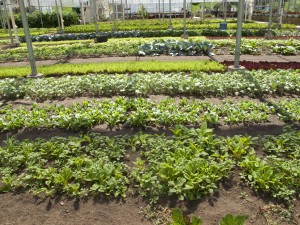
In the meantime, we decided to go to Stone Barns Center for Food and Agriculture the day after our fabulous meal. We packed Lindsay up after her sleepover and drove up to Tarrytown, NY. Stone Barns is set on 80 acres of gardens, pastures and woods. The mission of Stone Barns, as they say, is to celebrate, teach and advance community-based food production and enjoyment, from farm to classroom to table. We had fun in their impressive greenhouse finding some of the items in our meal from the night before. The different beds made a patchwork quilt effect.
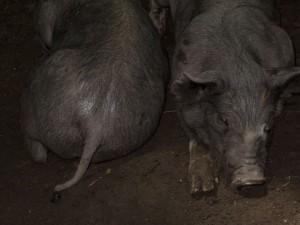
We wandered through the fields and woods to see their animals. The animals were kept in very spacious areas, and you could see that they move them around to different pastures often. They used portable electric fences that were powered car batteries. There were quite a few pigs that were in the woodsy area doing the things that pigs love best; sunning themselves, sleeping and rolling in the mud. The word transparency kept coming to mind. This operation was beautiful, productive and offered the animals a very nice life. I guess it’s weird to say they have a nice life when they are meat animals, but it is on the complete opposite end of the spectrum from feedlots.
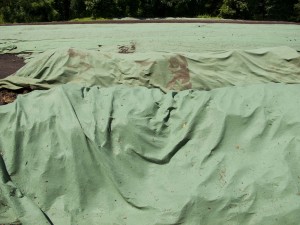
They even have a big composting area. They compost everything from the farm and the on-site restaurant. There were machines that looked as though they chop everything up into smallish pieces and then lay them out into windrows (long piles of compost). The windrows were covered to keep in the moisture. I read that they were interested inharnessing the heat that the compost produced as a way to heat the greenhouse in the winter, and worked to implement a compost heating system. I love this place!!
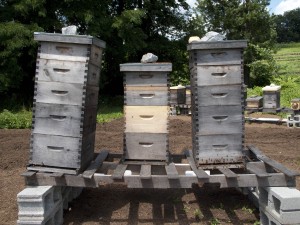
It felt as though we were walking through a botanic garden as we toured the grounds. After we passed the laying hens out in their enormous field, we came across their bee hives. I am fascinated with honey bees right now, and have a friend who keeps bees in Brooklyn and sells her honey. I’m still too chicken to make the leap into beekeeping!
I’ve always been curious to try hunting for wild honey. That entails watching the direction bees fly from the flowers they are pollinating and triangulating the path back to their hives, which are often in a hollow tree. I don’t have much opportunity to do that in NYC and I haven’t found a cohort. Plus I think you need to destroy the hive to harvest the honey and I wouldn’t want to do that. Can you imagine thousands of really pissed off bees with no home? Okay, so I like the idea of hunting honey, but not the reality. So when I saw bees (or possibly wasps) flying into a tree during our walk I was really excited. That could be my elusive honey tree!!
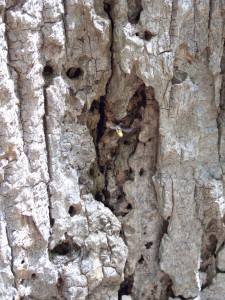
At the end of our visit, we had a snack in their little café and peeked into the Blue Hill restaurant up there. It was a fun escape from the city on a gorgeous summer day.
Today kicks off the 3rd National Pollinator Week and New York City beekeepers are campaigning to legalize beekeeping.
Things you can do during the week to show your support:
• You can click here to sign a petition to legalize beekeeping in NYC
• Go to the Beekeepers Ball on Monday 6/22 at Pier 17 (89 South Street) from 6pm-11pm. Click here for more info and tickets.
• Go to City Hall on June 23rd for a press conference and rally with other beekeepers and David Yassky. It will be held on the steps of City Hall at 12:30.
I’m having some technical difficulty, but when that is sorted out I will add a video of my friend Meg, who not only recently became a beekeeper, but has just ordered chicks for her backyard. Go Meg!!
TAKE A BASIC URBAN BEEKEEPING COURSE AND BE READY FOR 2009!
The NYCBA is offering two courses in 2009 for the absolute beginner and novice beekeeper. Each course is 12 hours long, spread out over four Sundays. (If a demand exists, we will consider adding a third group class on Saturdays in March.) The courses will meet on the Lower East Side of Manhattan at the University Settlement from 10:30AM – 1:30PM on the dates below. The cost of the course is $75. for the entire twelve-hour course.
February Course
February 1st, 8th, 15th, and 22nd (snow date March 1st)
March Course
March 8th, 15th, 22nd, 29th
COURSE DESCRIPTION:
This twelve-hour course will teach you everything you need to know to safely start and maintain a beehive. We will construct the hives for one hour of each session in order to introduce you to the intricacies of the hive itself, and spend the other two hours teaching/discussing everything from safe hive placement, general maintenance, and troubleshooting in the hive. Our emphasis is always on the safety and comfort of the bees, your neighbors, and you (in that order). Students will learn the players in the hive, the normal process and lifecycle within the colony, and how to best work with, appreciate, and enjoy beekeeping. New beekeepers will learn how to invigorate their vegetables and fortify their flowers (and those of the neighborhood) while contributing to the environment and ensuring themselves as much as 120 lbs of pure raw honey per year per hive. This course teaches everything you need to know to start or continue your fascinating love story with the bees. Learn about this fulfilling and rewarding hobby. Become a beekeeper. It is easier than you may think, and more rewarding than you might imagine.
To register for either course, please e-mail us!
Please include in your e-mail:
* your name
* your mailing address
* your level of experience in beekeeping
* please indicate if you are interested in the February or March course
If a course becomes full, we will update the website to reflect that. If we receive your payment within two days of changing the website, we will figure out a way to squeeze you into the group of your choice. An e-mail confirmation will be sent to you upon successful processing of your payment. If we can re-sell your seat we will happily refund your fee once payment is made (but we will miss you in that case).
Another option is to pay in person at one of our monthly meetings. Bring cash or check.
Cancellation policy:
If you cancel within one week of the first day of class, the full course fee will be charged.
This Saturday our friends who moved to CT came down and we all went to the Red Hook Harvest Festival at the Added Value Farm, which is a farm my friend Alison started as part of her work for Heifer International. For anyone who isn’t familiar with Red Hook, Brooklyn it is a very urban area.
It was a beautiful day and the turnout was great. There were informational booths on composting and building rain barrel systems, there was food from Rice, there were chickens from the Red Hook Poultry Association, there was an area for costumes and face painting. Lindsay’s friend Mason dressed himself up and had his face painted as an asparagus. He was obviously inspired by his surroundings, because this is a kid who barely touches vegetables!
I caught the tail end of a canning workshop by an amazing woman named Classie Parker. I definitely have to track her down because she was extremely knowledgeable and a total riot.
A man named Roger Repohl gave a talk on urban beekeeping. He keeps bees at a community garden in the Bronx and shared a lot of his knowledge. He brought his honey and let us sample it. The honey was divided up by times of the year. The earliest honey was a pale lemon yellow and the latetest honey was a dark amber color. I liked the honey on both ends of the growing season best. The early honey was delicious with a subtle minty taste. Roger said that it was from the bees gathering nectar from Linden and basswood trees. The honey from the end of the summer had a very fruity flavor. The honey from the middle of the summer tasted more like regular honey that you get from the store. I’ve tried honey from bees that pollinate various plants, such as lavender or clover, but it was interesting to taste the difference of honey based on what the bees find in the Bronx at different times of the growing season.